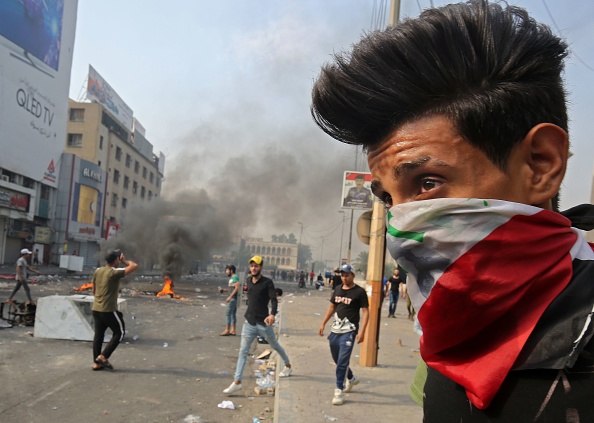If anything, the use of force by the Iraqi regime to quell the demonstrations, only lead to a wider division between the Iraqi political class and the Iraqi people. But the most significant outcome, is that the cities and towns that rose against the leadership are Shia-majority cites, meaning that Iran’s ideology of Wilayat Al-Faqihdid not spread in Iraq the way Tehran meant it to. Another important outcome is that the political class came out divided into two components: one that still believes in Iraqi state institutions and national identity, but is too weak to contribute to any vital change, and another, the armed Iranian-backed militias represented by the Popular Mobilization Forces, which are strong enough to use violence and kill people without any fear of retribution or accountability.
THE HASHD POWER
Faleh Al-Fayyad, the head of the Popular Mobilization Forces, was very clear in his statements that followed the demonstration. He defined what Iraq would look like when he said that the violence used by his forces against the unarmed demonstrators was to defend the Iraqi state, and that his forces are ready to face whoever will try to challenge their power over the State and its institutions.
This is very similar of what happened in Lebanon during the May events of 2008, when Hezbollah’s forces attacked the Sunni and Druze areas in Lebanon, forced their March 14 opponents to go to Doha where the infamous Doha agreement was signed and when everyone surrendered to Hezbollah. At that moment, the political balance in Lebanon was eradicated and Hezbollah actually took control.
The Iraqi street might be stronger than Lebanon’s political leaders, and the Iraqis will probably go back to the streets again to tell Iran that this is not over; however, according to the Hashd (PMFs), challenging Iran’s power in Iraq will not be tolerated.
Meanwhile, Adel Abdel Mahdi’s government found itself on the margins, unable to stop the bloodshed, and incapable of offering real promises to the people. The list of “reforms” that it announced were short of a real vision and a sustainable program. All he did was promise more charity to the Iraqis without addressing the real questions.
Fearing a new and wide range of demonstrations, Abdel Mahdi continues to arrest activists and threatens a crackdown on the Iraqi people, mainly in Shia areas. Nothing he did proved to the Iraqis that his government was even a little independent from the Iranian regime. The real authority in Iraq is the Hashd and that was the reality that unfolded itself after the first of October.

Looking forward, Abdel Mahdi will probably not resign, even if he wanted to. He will not be allowed to resign because Iran needs this system. Other Iraqi leaders such as Muqtada Al-Sadr and Ammar Al-Hakim, who were taken and overwhelmed by the Iraqi street will try to tactically move around these voices to show that they still in control of the street and that they have not lost this leverage.
However, it seems the Iraqi street has moved away already and the only internal power that can still protect it to a certain extent is Sistani and the Najaf. The first statement that came from Najaf was weak and was obviously neutral to everyone. However, as the days passed, Najaf’s rhetoric got stronger and more to the side of the street. This is still not enough, and the main religious institution for the Arab Shia needs to realize this historic moment and help Iraq move away from Iran.
THE SHIA STREET
When the Iraqi Shia burns the Iranian flag in the streets of Iraq, it is a moment that should not be taken lightly. The Arab world witnessed many demonstrations in the past decade. Sometimes these were against dictators, such as in Egypt, an others against the “system” such as in Lebanon. In many cases, it was in sectarian milieu such as in Syria where the Sunni-majority rose up against the Alwaite minority. In Lebanon, demonstrations happen on a regular basis, but it is always against the others’ leaders. The Shia in Lebanon almost never demonstrated against Hezbollah.
In Iraq, for the very first time in the Arab world, the Shia rose up against the Shia leaders backed by Iran. And this is a big deal.
However, these demonstrators will have to face many challenges in the days to come if they were to continue with their revolution, knowing that Iran will never voluntarily let go of Iraq. They will have to deal with the Hashd directly, as the protector of Iran in Iraq, and they will have to face them in the streets and in the institutions. Also, the demonstrations should include other communities, like the Sunnis and the Kurds. That’s how it develops an encompassing national identity. Moreover, a real vision with a clear political program and clear demands need to be made in order to achieve anything realistic.
What happened early October in Iraq was fascinating on many levels, but it should be the beginning of an elaborate and clear political process that moves through the street to the Iraqi political institutions.
Iran needs Iraq, as much as it needs Syria and Lebanon. However, Iraq has an economic and financial value for the Iranian, as an alternative source of funding, in the light of the increased US sanctions. Iran will use everything in its capacity to crush the opposition, especially within the Shia street, and it will go beyond the level of crimes it committed in Syria to protect Bashar Al Assad.
Without Iraq, Iran will lose to sanctions and international pressure. That is exactly why this battle should be a smart one.
Hanin Ghaddar is the inaugural Friedmann Visiting Fellow at The Washington Institute.







